Five Ways to Protect Our Ocean
We live in a day and age where every small action has an impact on our planet, our only home which is unfortunately in a period of crisis. It is thought we are experiencing a mass extinction event, the biggest since the extinction of the dinosaurs – except this one is being caused by humans. We know that action needs to be taken now to ensure this rapid rate of extinction is slowed, habitats are kept intact, healthy and protected else the effects of this reduction in species diversity and disappearing habitats could be devastatingly irreversible. Several thorough scientific reports have recently stated that Asia will have no fish stocks for commercial fishing by 2048. This will cause unimaginable problems for the ocean as well as the people that depend on it.
Scientists estimate that we are losing species 1,000 to 10,000 times faster than the background rate and so many species are disappearing every day, never to be seen again. Just recently I read the story of George, a lonely Hawaiian snail residing at the University of Hawaii and thought to be the last of his species, who passed away without ever being able to sire offspring. His death marked the first recorded species extinction of 2019.
Maybe snails are not so charismatic as the bigger species that people tend to worry about losing, but George had his place in the ecosystems just as any other popular endangered megafauna does. George’s species were grazers, and at the moment it is uncertain as to how this will affect the ecology of the Hawaiian Islands, but when you remove grazers from an ecosystem your changing the process of the breakdown of plant matter and how the nutrients return to the soil. Only time will tell how the islands will cope after Georges disappearance.
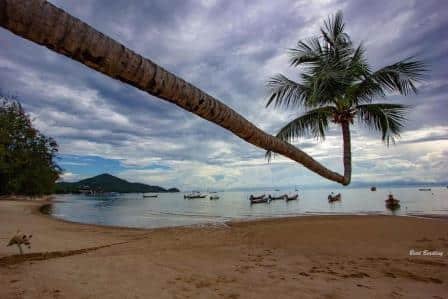
What can we take from this? Well, we live in a society where science and technology are bringing us much closer to the reality of the situation. Never has it been easier to study these creatures and look deeper into the reasons behind what is happening, why it’s happening and, most importantly what each and everyone of us can do to help. Many people choose scuba diving to bring them closer to the natural world in a way that 100 years ago people could only dream about. Scuba divers have a connection with the ocean that others do not have, and it is this connection that inevitably leads to an awareness and a change in behaviour. We are in a position to be ambassadors for the ocean and wildlife conservation and dive operators should be exercising their duty to protect and conserve.
The Plight of Plastic
Plastic is probably the most convenient yet most destructible invention of our time. All plastic that has ever been produced is still on our planet, much of it drifting across the ocean, causing death by entanglement and ingestion to millions of marine animals. We are all well aware of the impact plastic has on the environment and fortunately, there are a lot of highly successful projects that are aiming to prevent the production of plastics at the source, whilst others focus on the efforts of clean ups.
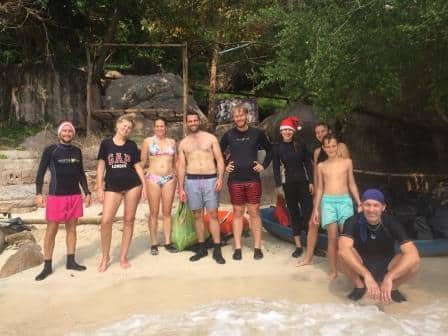
Here at Master Divers we attempt to attack the plastic crisis from both parts. Taking a quick browse in our shop will show you that we encourage divers to use eco-friendly, natural or sustainable products. We hold beach clean ups throughout the week outside the front of our dive shop that we encourage all to get involved in. On a larger scale, we have a monthly Protect AWARE Dive Against Debris at our adopted dive site, Laem Thian. This is a free dive or snorkel offered to anybody and everybody who want to lend a hand. Laem Thian is a beautiful secluded bay on the East side of Koh Tao which attracts a lot of trash, not necessarily from Koh Tao, but from other parts of Asia that are bought in with the wind and currents. Next time you visit us, ask us about our Project AWARE Dive Against Debris even and join us for an extremely purposeful day trip!
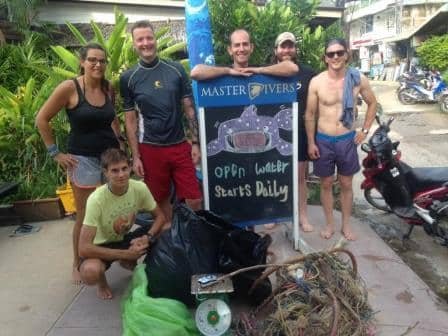
Taking a Closer Look – Water Testing Around Koh Tao
A lot can be discovered by looking at the quality of the water surrounding our island and that is why we were one of few schools to be invited to take part in a long term project developed by Innoceana. Innoceana are a Non Profit Organisation and a team of scientists and divers who travel across the world and set up projects to gain a deeper insight into the health of the ocean. They collaborate with external partners such as dive centres to help gain the important and extensive data sets needed for successful analysis.
All PADI Divemaster Candidates studying at Master Divers learn the importance of this research and are taught the basic methods of data collection so that they can collect and analyse water samples on a weekly basis, which is then passed onto Innoceana. It is a brilliant project which really begins to combine recreational diving with conservation and citizen science diving.
Watching Corals with Coral Watch
Aside from overfishing, much of the species extinction within the ocean lies almost solely on the health of the coral reefs. Over a quarter of all marine life depends on coral reefs for their shelter and food. As pressures on coral reefs increase, in the forms of destructive fishing techniques, warming of the ocean and the changes in ocean chemistry, we are seeing the suffering of corals across the world. Stressful environmental conditions can cause coral to expel their symbiotic algae which causes the coral to lose its colour. The longer it is exposed to the stressor, such as increased water temperature, the greater the chance of the coral dying.
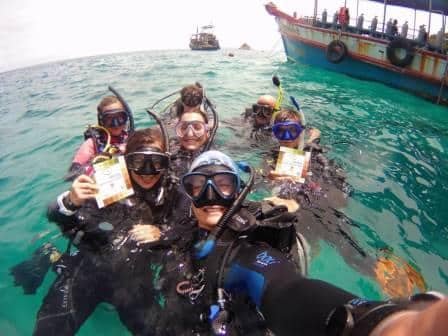
Coral Watch have created a citizen science project that is easily accessible to us all. By developing field materials that can be used on dives, it is easier than ever to keep a close watch on the health of the corals. At Master Divers we do a monthly eco dive which assess the severity of bleaching on randomly sampled corals. It acts as a perfect introduction into the world of citizen science to new and experienced divers who are looking for more of a purpose when fun diving.
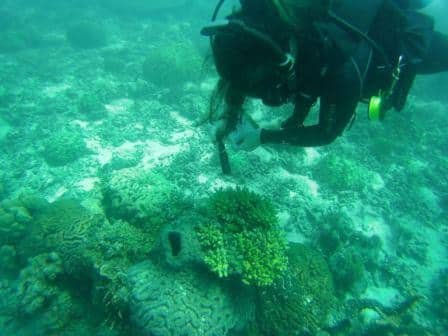
Keeping it Local
You have probably heard the phrase “Think, global. Act local” and at no other point in time has this been more relevant. All change starts from the ground up and engaging in local projects and engaging the community helps create that awareness of individual responsibility and how it relates to the protection of the planet on a much greater scale.
Koh Tao Earth Day group are a team of passionate people from dive schools that have the experience and funds to initiate grassroot projects. We have recently released the news of a large, island-wide Eco-Bricks project which you can read more about in our Eco-Instructors recent blog here! It is projects like this that not only bring the community together but act as a tool for education and help inspire future generations and evolve our attempts at thinking globally and acting locally.
Knowledge is Power
Every action mentioned so far is underlined with education. Education is the basis to everything and is necessary if we are to change the fate of our planet. Therefore, Master Divers prides themselves on delivering the best dive training which inevitably includes many elements of environmental awareness. We hold regular Eco talk nights at the wonderful Coconut Monkey, with amazing vegan food and we offer packages tailored to suit individuals that wish to learn a lot more about conservation diving and how they as divers can help the oceans.
Knowledge really is power. And with this quality, passion-driven education divers are well equipped and empowered to move forward and begin making those small steps in contributing to the protection of our only planet.
